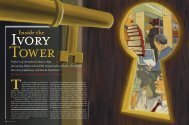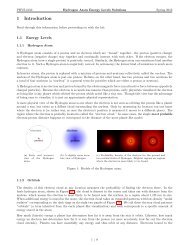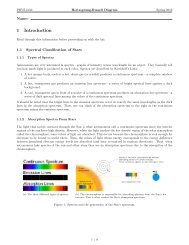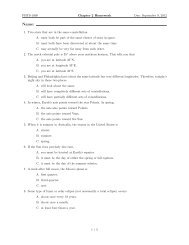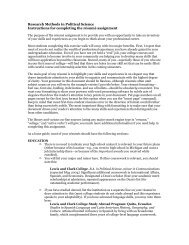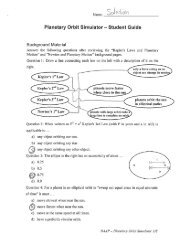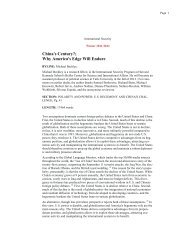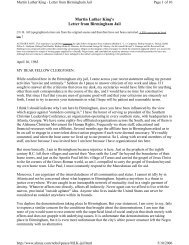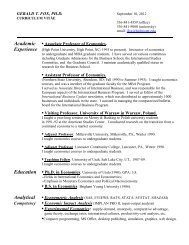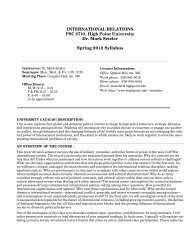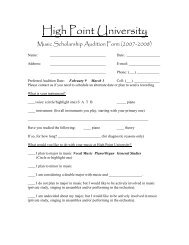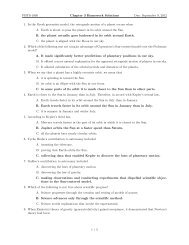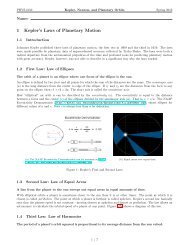China's Challenge to US Hegemony - High Point University
China's Challenge to US Hegemony - High Point University
China's Challenge to US Hegemony - High Point University
You also want an ePaper? Increase the reach of your titles
YUMPU automatically turns print PDFs into web optimized ePapers that Google loves.
16 • CURRENT HISTORY • January 2008<br />
As President Bush declared in a November 2005<br />
speech in Kyo<strong>to</strong>, responsibility also requires China<br />
<strong>to</strong> achieve political liberalization and develop as a<br />
free market economy firmly anchored <strong>to</strong> the international<br />
economy.<br />
Indeed, us policy makers believe that, over the<br />
long term, peaceful relations are possible with Beijing<br />
only if China undergoes domestic political and<br />
economic liberalization. As a result, the United<br />
States aims <strong>to</strong> promote China’s internal transformation.<br />
As the Bush administration’s National Security<br />
Strategy declares: “America will encourage the<br />
advancement of democracy and economic openness”<br />
in China, “because these are the best foundations<br />
for domestic stability and international<br />
order.” As then-Deputy Secretary of State Robert<br />
Zoellick said in 2005, “Closed politics cannot be a<br />
permanent feature of Chinese society.”<br />
us officials believe that nations such as China<br />
that do not adopt American-style political and economic<br />
systems, and that do not play by the rules of<br />
the American-led international order, are ipso fac<strong>to</strong><br />
threats <strong>to</strong> us interests—threats <strong>to</strong> which America<br />
must be prepared <strong>to</strong> respond aggressively.<br />
Here is where America’s willingness <strong>to</strong> employ<br />
the hard fist of military power against China<br />
comes in<strong>to</strong> play. The Bush administration has<br />
said it “welcomes a confident, peaceful, and prosperous<br />
China that appreciates that its growth<br />
and development depend on constructive connections<br />
with the rest of the world.” At the same<br />
time, however, Washing<strong>to</strong>n has made crystal clear<br />
that it will not countenance a China that emerges<br />
as a great power rival and challenges American<br />
primacy. The 2002 National Security Strategy<br />
enjoins Beijing from challenging the United States<br />
militarily and warns that, “In pursuing advanced<br />
military capabilities that can threaten its neighbors<br />
in the Asia-Pacific region, China is following<br />
an outdated path that, in the end, will hamper its<br />
own pursuit of national greatness. In time, China<br />
will find that social and political freedom is the<br />
only source of that greatness.”<br />
As Washing<strong>to</strong>n sees it, China has no justifiable<br />
grounds for regarding the us military presence<br />
in East Asia as threatening <strong>to</strong> its interests. Then–<br />
Defense Secretary Donald Rumsfeld made this point<br />
in 2005 when he stated that any moves by China<br />
<strong>to</strong> enhance its military capabilities necessarily are<br />
signals of aggressive Chinese intent. According <strong>to</strong><br />
Rumsfeld, China’s military modernization cannot<br />
possibly be defensive because “no nation threatens<br />
China.” Rumsfeld’s view was echoed in the admin-<br />
istration’s 2005 report on The Military Power of the<br />
People’s Republic of China, which stated that “China’s<br />
military modernization remains ambitious,”<br />
and warned that in coming years “China’s leaders<br />
may be tempted <strong>to</strong> resort <strong>to</strong> force or coercion more<br />
quickly <strong>to</strong> press diplomatic advantage, advance<br />
security interests, or resolve disputes.”<br />
Similarly, at an Oc<strong>to</strong>ber 2007 conference on<br />
Sino-American relations Admiral Timothy Keating,<br />
the commander in chief of the us Pacific Command,<br />
made three points with respect <strong>to</strong> America’s<br />
China strategy. First, the United States will seek<br />
<strong>to</strong> maintain its present military dominance over<br />
China. Second, America will, through arms sales,<br />
ensure there is a cross-Strait military balance<br />
between Taiwan and China. Third, the United<br />
States will not allow China <strong>to</strong> change the status<br />
quo in Taiwan by force. In short, the United States<br />
is determined both <strong>to</strong> make sure that China does<br />
not emerge as a peer competi<strong>to</strong>r and <strong>to</strong> impose<br />
itself as an obstacle <strong>to</strong> China’s overriding national<br />
goal of reunification with Taiwan.<br />
stRangling the baby<br />
China’s rise affects the United States because<br />
of what international relations scholars call the<br />
“power transition” effect: Throughout the his<strong>to</strong>ry<br />
of the modern international state system, ascending<br />
powers have always challenged the position of the<br />
dominant (hegemonic) power in the international<br />
system—and these challenges have usually culminated<br />
in war. Notwithstanding Beijing’s talk about a<br />
“peaceful rise,” an ascending China inevitably will<br />
challenge the geopolitical equilibrium in East Asia.<br />
The doctrine of peaceful rise thus is a reassurance<br />
strategy employed by Beijing in an attempt <strong>to</strong> allay<br />
others’ fears of growing Chinese power and <strong>to</strong> forestall<br />
the United States from acting preventively during<br />
the dangerous transition period when China is<br />
catching up <strong>to</strong> the United States.<br />
Does this mean that the United States and China<br />
are on a collision course that will lead <strong>to</strong> a war in<br />
the next decade or two? Not necessarily. What happens<br />
in Sino-American relations largely depends<br />
on what strategy Washing<strong>to</strong>n chooses <strong>to</strong> adopt<br />
<strong>to</strong>ward China. If the United States tries <strong>to</strong> maintain<br />
its current dominance in East Asia, Sino-American<br />
conflict is virtually certain, because us grand strategy<br />
has incorporated the logic of anticipa<strong>to</strong>ry violence<br />
as an instrument for maintaining American<br />
primacy. For a declining hegemon, “strangling the<br />
baby in the crib” by attacking a rising challenger<br />
preventively—that is, while the hegemon still



